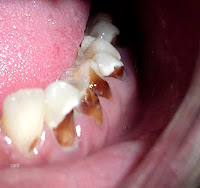This blog has moved to a new website
Nutrition, Health & Wellness
The high levels of carbohydrates and simple sugars present in them tend to ferment in oral cavity and affect the dental health by the formation of dental plaque and tooth decay. Further, most of the soft drinks are acidic in nature due to the ingredients used and also due to carbonating them.
When soft drinks are carbonated with carbon dioxide they turn acidic due formation of carbonic acid. The quantity of carbonic acid is directly proportionate to the amount of pressure of carbon dioxide over the liquid.
 Tooth decay
Tooth decaySlow sipping of these beverages (acidic in nature) over a period of time can affect dental health by eroding the tooth enamel and causing cavities. Drinking soft drinks through a straw must be preferred as the beverage gets swallowed from the rear end of the mouth giving less exposure to teeth.
Chronic consumption of these beverages has been found to give rise to health problems like low potassium levels (hypokalemia). There is a possibility of more excretion of calcium and lowered intake of calcium when these drinks are consumed frequently leading to loss of bone density.
Unless fortified with nutrients, these drinks are very low in vitamins, minerals, proteins, essential fatty acids and essential amino acids required for general health. Soft drinks deliver high food energy and calories and frequent consumption can give rise to obesity, diabetes and related cardiac health problems.
No comments:
Post a Comment